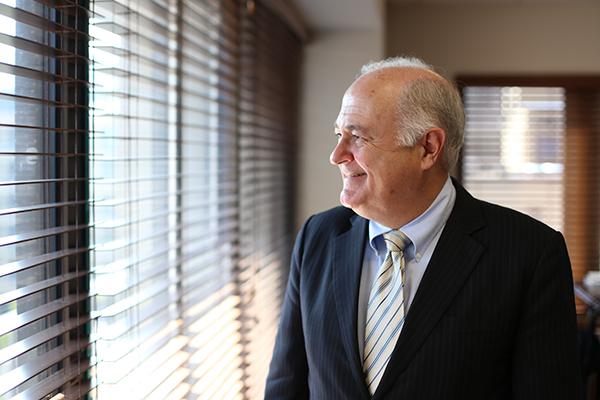University President Steven Knapp wants to get a better sense of the inner workings of GW’s more than 70 academic departments.
Faculty don’t usually meet with Knapp, who is responsible for courting donors and represents the University on several national boards and committees. But Knapp said occasionally meeting with groups of professors has helped him better grasp what’s happening within GW’s 10 schools, which he then uses when speaking with potential donors.
Over the past three years, Knapp said he has connected professors who have similar research interests, and he’s gathered stories to share with donors in the process. He’s even had air conditioners fixed for department offices since he started meeting off-and-on with professors, he said.
Typically, faculty meet with their dean or with Provost Steven Lerman to express concerns or talk about the direction of academic programs. Knapp visited the chemistry department this month, and plans to visit the mechanical and aerospace engineering department in early November. He has also met with the biology and religion departments.
“In that way, it’s like a cross-pollination thing. I’m like a little bee, flower to flower,” he said.
Knapp has translated those moments into anecdotes he can share when he meets with deep-pocketed donors – an ever more important part of his job as the face of GW during its $1 billion fundraising campaign.
“When I’m talking to a donor, I’m speaking from a base of familiarity and not just abstractly. We’re not just any university. We’re a university that does specific things and makes a difference in specific lives,” he said.
Donors are helping fund the University’s decade-long strategic plan, which focuses on bringing in new faculty, growing research and revamping academic programs. As president, Knapp is charged with pointing to how GW’s programs stand out from competitors and how a donation can make a difference.
Paul Duff, a professor of religion, said Knapp spoke with his department about University goals, but mostly asked questions and discussed the group’s research interests.
“It is good for faculty to hear issues from the perspective of the president. He has to deal with things that we know little about. Conversely, it is good for the president to hear the concerns of the faculty, what things are like ‘in the trenches,’” he said.
Other University presidents haven’t met with faculty, said chemistry professor Akos Vertes, which shows professors that Knapp wants to learn more about academic programs.
When they met with Knapp, chemistry professors told him that their department offers fewer teaching assistant positions to graduate students than competitor schools, which made it difficult for them to recruit.
“The focus from the department’s perspective was to give the president information on the number of graduate positions available, and this is something that he didn’t know about,” Vertes said.
Mohammad Faghfoory, the director of the master’s in Islam program, said university presidents don’t typically form personal relationships with faculty.
“Person-to-person contact is always good. It gives the faculty members the chance to discuss urgent issues,” Faghfoory said. “It is good for the president to know what kind of challenges and issues are facing each department.”
Charles Garris, the chair of the Faculty Senate executive committee who has worked at GW for 30 years, said top administrators haven’t gone department-to-department in the past, but that it was refreshing for faculty to get to meet with Knapp.
“He wants to hear first-hand what the concerns are in terms of the University, what faculty think needs to be done. He wants to get a first-hand perspective,” Garris said.
Knapp regularly sees tenured professors who serve on the Faculty Senate during the organization’s regular meetings.
He said he’s learned about administrative challenges and other difficulties that departments face while meeting with them. But with more than 40 departments in the Columbian College of Arts and Sciences alone, he said it would take a long time to reach everyone.
“I hope to get to everyone at some point, but it’s a challenge to get through them all,” Knapp said.
Mary Ellen McIntire and Colleen Murphy contributed reporting.








